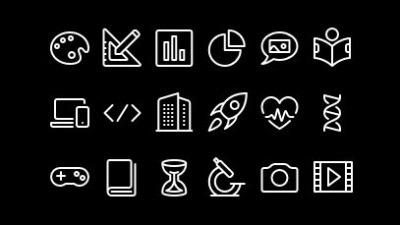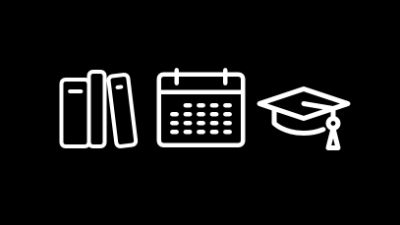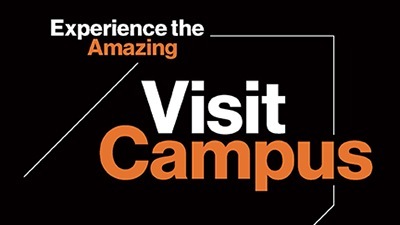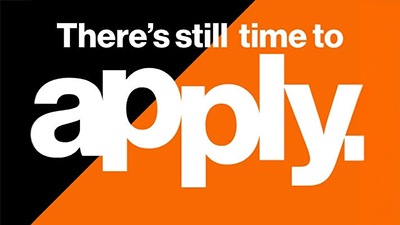NTID Professional Development (PD) Program
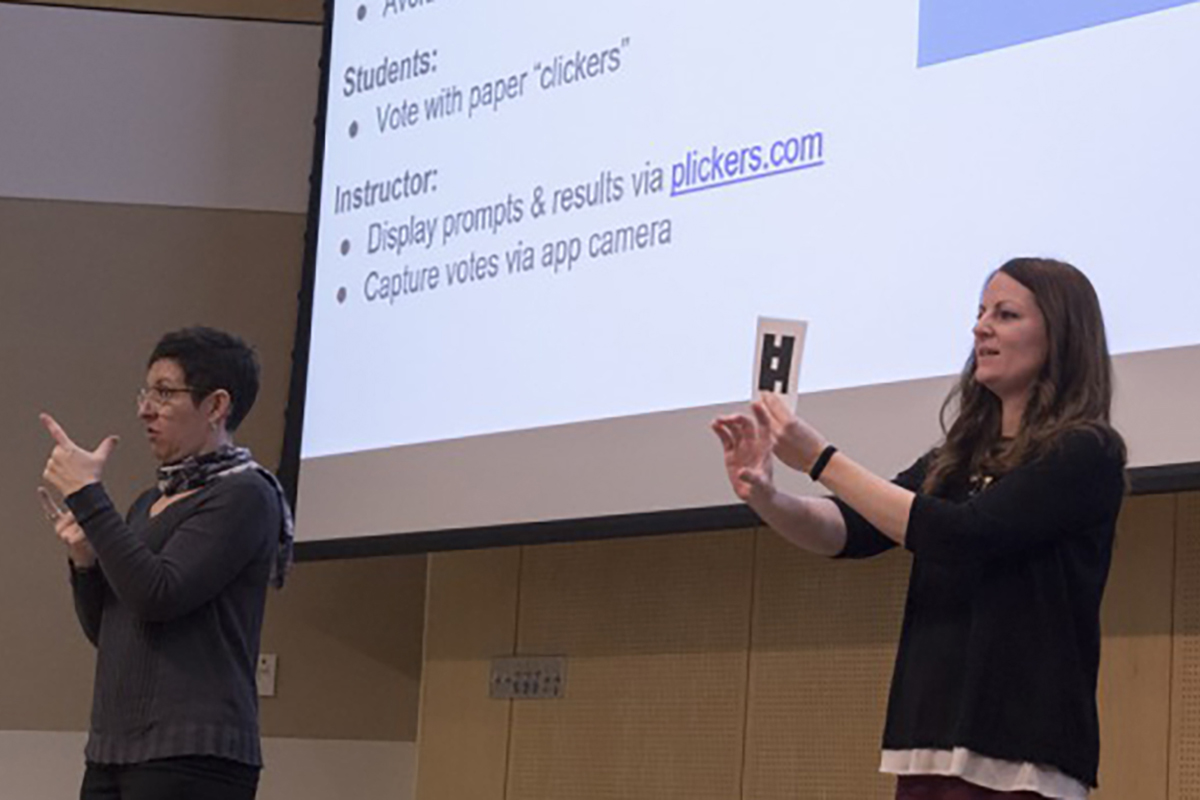
Professional Development
- RIT/
- National Technical Institute for the Deaf/
- Professional Development
Mission
The mission of NTID’s Professional Development (PD) Program is to initiate and facilitate professional growth opportunities for all faculty and staff.
Our goal is to foster the continued growth of faculty and staff as they progress through various career stages. We achieve this through collaboration with many professional development organizers within and external to RIT.
The Professional Development Team designs programs that address the following areas:
- Teaching
- Workplace Skills and Productivity
- NTID Culture and Diversity
- Leadership
- Technology
- RIT/NTID Policy
- Mentorship
- Scholarship/Research/Grants
Visit the PD Archives for annual reports of professional development programs and outcomes.
Opportunities for Professional Growth
In addition to NTID's PD program, the university has many professional development resources, including:
Welcome New Faculty and Staff!
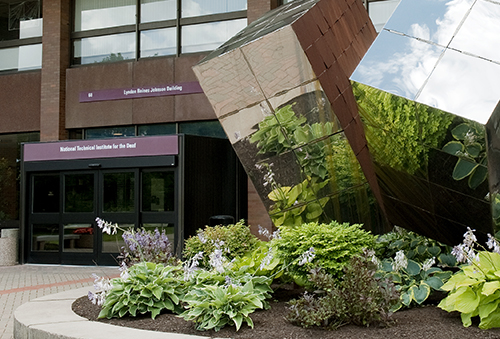
Welcome to NTID! As a new member of our community, we hope you will have a positive and productive experience. RIT/NTID provides employees with many opportunities for professional growth and development. Development can occur in a variety of ways including workshops, seminars, and individual research.
To help you become acclimated to the university, we have prepared guidebooks with some essential information. We hope this information will help you get off to a good start as you begin your career at RIT.
Getting Started at RIT
Onboarding Checklists
- Onboarding Checklist for New Employees (Faculty and Staff) (pdf) (docx)
- Full-time Faculty Onboarding Checklist (pdf) (docx)
- Adjunct Onboarding Checklist (pdf) (docx)
- Onboarding Checklist for Managers/Supervisors/Chairs (pdf) (docx)
Welcome Guides - Essential Info about RIT/NTID
Workshops
All faculty and staff are invited to any programs listed below. Please make sure to register for these programs.
Check weekly email announcements for new workshops!
AI Machine Learning and Data
Wednesday, March 18, 2026
12-1 p.m.
CSD Student Development Center - 1300/1310
Facilitated by: Quinny Campbell, Lecturer, Science and Mathematics
Pre-Symposium Module: AI in a Nutshell
How does Netflix know what you want to watch next? And how does your phone finish your sentences?
Machine learning has been quietly shaping our world long before ChatGPT made headlines. In this second workshop leading up to NTID’s AI Symposium in May, we’ll pull back the curtain on machine learning: what it is, how machines learn from data, and why it sits at the heart of nearly every AI system you’ve encountered. No prior AI experience is required—no jargon and no math. Just clear, high‑level concepts designed to help you walk away with a clearer understanding of what powers today’s AI tools and a new way of thinking about the data behind them.
ASL interpreters have been requested.
For more information, contact Kemoy Campbell (kscics@rit.edu).
Workshops Archive
(Requires RIT Login )
In this video series, Joan Naturale, NTID Librarian, demonstrates how to access and use library resources and databases.
- NTID Librarian Support Videos - YouTube Playlist of all Videos
- Finding Articles in the Opposing Viewpoints Database (12:25)
- Finding Books: e-Books and Print Books (8:04)
- Finding Deaf e-Journals (11:20)
- Deaf Biography Research (6:18)
- Finding Articles in the CQ Reader Database (7:29)
- Finding Articles in the SIRS Researcher Database (8:05)
- Finding Popular Deaf Magazines (10:38)
- Finding Encyclopedias (13:42)
- Google Scholar and Interlibrary Loan: Part 1 (11:15)
- Finding Films (e-Films and DVDs) (9:48)
- Google Scholar: Part 2 (4:35)
- Interlibrary Loan Services (ILL Services): Part 2 (5:34)
- Order Books and Articles via Interlibrary Loan (ILL) (4:39)
- Library Account: Set-up, Renewals and Borrowing Periods (3:34)
- Avoid Plagiarism: Part 1 (6:22)
- Avoid Plagiarism and Citation Guides: Part 2 (10:29)
- Using Summon, A Discovery Tool (7:56)
- Introduction to InfoGuides: MSSE (13:48)
Grants and Funds

Mini-Grants
Mini-grants provide NTID non-tenure track faculty and exempt staff with an additional source of funding to facilitate their participation in innovative professional development activities, such as conference registration and/or skill development training. Awards are not to exceed $500.
NOTE: If you have received FEAD funding for an activity, you are ineligible to receive a mini-grant for the same activity.
Application Form: ( PDF | DOC )
FEAD Grants
Tenure-track faculty, senior lecturers, principal lecturers, and lecturers with multiple-year contracts may be eligible for Faculty Education and Development Grants.
Faculty Evaluation and Development (FEAD) grants provide monetary assistance to NTID faculty members for the purpose of pursuing areas of professional development that address the university’s priorities and/or department, college, or university’s strategic plans. Priorities cover the following five areas: 1) academic excellence; 2) student success; 3) research, scholarship, creative work and innovation; and 4) faculty success.
NOTE (10/01/2025): FEAD applications will be reviewed on a very competitive basis. The link to identified areas of development in the faculty member’s Plan of Work (made in conjunction with their annual review) must be clear and strongly supported in order to be considered for funding.
- FEAD Guidelines ( PDF | DOC )
- FEAD Application ( PDF | DOC )
- FEAD Statement from Department Chair ( PDF | DOC )
- FEAD Award Evaluation Report ( PDF | DOC )
- FEAD Funds Reimbursement Procedure ( PDF | DOC )
For more information about FEAD Grants, contact Todd Pagano at tepnts@rit.edu.
Funds for Individual Professional Development
Do you need funds for a professional development activity, such as a conference or non-credit course? NTID has an annual allotment of funds for each faculty or staff member.
- NTID PD Funds Guidelines ( PDF )
Ronald D. Dodge Memorial Endowment Fund
A grant of up to $1,000 is offered annually to RIT faculty for financial assistance in supporting research and development efforts conducted during the academic year. Projects must have as their purpose improving the effectiveness of faculty engaged in educating deaf and hard-of-hearing students at RIT.
Intermedia Synthesis: Fostering Collaborative Audiovisual Creation for Deaf, Hard-of-Hearing, and Hearing Students
Assessing Ableism in Campus Biology Textbooks and Teaching Materials
Assistive Technology for Deaf and Hard-of-Hearing (DHH) Students
Enhance Visual Aid in Manufacturing for Deaf Community
Student-Generated Curriculum Videos: Personal Finance Course
No grant awarded
The Cognitive Theory of Multimedia Learning
Organic Chemistry in ASL
Evaluating Video Features for Online Learning at NTID
Mobile Applications to Enhance Communication in Learning and Business Environments
Quiet Chemistry: Working with Deaf Students in a Chemistry Lab
Engaging NTID Student Learning and Research by Exploring the Features of Smartphones
Implementing Full Access Video Lectures to Improve Understanding and Performance of All Students in a Large Science Classroom
Writing Together: Deaf/Hard-of-Hearing and Hearing Students in a Conjoined First Year Writing Class
Graphic Storytelling as Part of the Classroom Curriculum for Deaf Students
Online Technologies to Facilitate Access for Deaf/Hard of Hearing Students in Lab Courses
No grant awarded
Methods of Adapting Case Teaching for Deaf and Mixed (Deaf and Hearing) Student Groups
Dynamic Keyboard
Online Caption Error Reporting System
Teaching Teams: a Dialogue Between ASL Interpreters, C-print Captionists, and CLA Faculty
Backchannel Chatter, Divided Attention and Learning
Multimedia Authoring Tool and Training Resources for Developing Sign Language and/or Captioned Video Lessons and Tutorials to Support Classroom Teaching and Distance Learning
No grant awarded
Online E-mail Etiquette: A Multimedia Version
Promoting Access for Deaf Students in College of Science Courses
Online Email Etiquette: A Job-Related Perspective for Students
Web-based Remote Tutoring System
Web-based Instructional Testing and Evaluation System
Computerized Instruction for Academic Reading
No grant awarded
Using Voice Recognition Techniques to Provide 'Instantaneous' Closed Captions for Videotapes
Design Through Culture
RIT and Learner Diversity: Teaching Each and Every Student
A Study of Teaching and Learning Styles
Deaf Students Enrolled in Regular Colleges and Universities
Evaluating Accessibility of NTID Student/Staff/Faculty Instructional Computing Resource Center (ICRC)
The Rape and Sexual Assault Training Program for Counselors
No grant awarded
The Use of Concept Maps for Science Instruction
The Evaluation of Existing Personal Computer Software for the Macintosh Such as Spelling and Grammar Checkers by NTID Students
The Development of Domain-Specific Concepts: Novice vs. Expert Photographers
Student Retention
Using Reality Therapy with Deaf College Students
Other Funding Opportunities
RIT and NTID Fellowships, Leaves, and Grants
Several funding opportunities exist at RIT for faculty and staff development, or for special projects that support RIT's teaching and learning activities:
- Faculty Leave for Professional/Career Development
- Provost's Learning Innovations Grant for Faculty Projects
- Provost's Cultural Diversity Grant
- Interactive Learning Grants
- NTID Faculty Evaluation and Development (FEAD)
- FYE/NTID Extracurricular Opportunity Grant
For more information, visit the RIT Office of the Provost’s Grants and Funding.
Staff Assistants and Specialists
- Essentials for Administrative Support Staff (including senior/staff assistants, senior/staff specialists, and other administrative support staff)
Do you need funds for a professional development activity? Please see your department chair/manager to discuss accessing these funds.
- NTID PD Funds Guidelines ( PDF )
Employee Development Plans (EDPs) for Staff
Employee Professional Development Plans: A Blueprint for Professional Growth
An Employee Development Plan (EDP) can guide you in setting goals for developing skills or knowledge to enhance your career. To engage in professional development activities that are relevant and rewarding, you are encouraged to design an action plan tailored to your unique needs, job requirements, and career goals. EDPs may reflect individual, department, and/or university goals. By collaborating with your manager/department head, mentors, and other colleagues, you can evaluate professional development opportunities and identify those that can help you achieve your goals.
To be effective, your EDP should be:
- developed jointly by you and your manager/department head
- linked to your job description or Plan of Work (POW)
- periodically reviewed by you and your manager/department head
Please note that EDPs are not to be used to address performance issues. Your supervisor is responsible for working with the HR Services Manager to initiate a performance improvement process.
Staff are encouraged to use, or customize, one of the following forms:
For questions or assistance regarding EDPs, please contact Hope Williams, Director, NTID Professional Development Program.
Faculty should contact Todd Pagano for Individual Development Plans for faculty.
Faculty Mentoring
Mentoring is a powerful tool to help you define and achieve your career goals. Individuals at all career stages can benefit from mentoring! NTID uses a network-based mentoring model that is initiated by the development of Individualized Development Plans. Submit a request today and a member of NTID’s mentoring committee will contact you to get the process started.
Teaching Observations
Teaching observations can help you enhance your instructional strategies and classroom management techniques. While you should reach out to your department Chair for formal annual observations, you can request a peer teaching observation below, and an NTID representative will contact you to help you achieve your professional development goals!
Archived Reports
The Archives contain Professional Development year-end reports and other historical documents. You must login with your RIT DCE account to access the archives.
Archived Reports Portal
(Requires RIT Login )
Contact Us
Professional Development Team
We are available to work with you to achieve your professional development goals. Contact us today! Or if you have a recommendation for PD programming, let us know!

